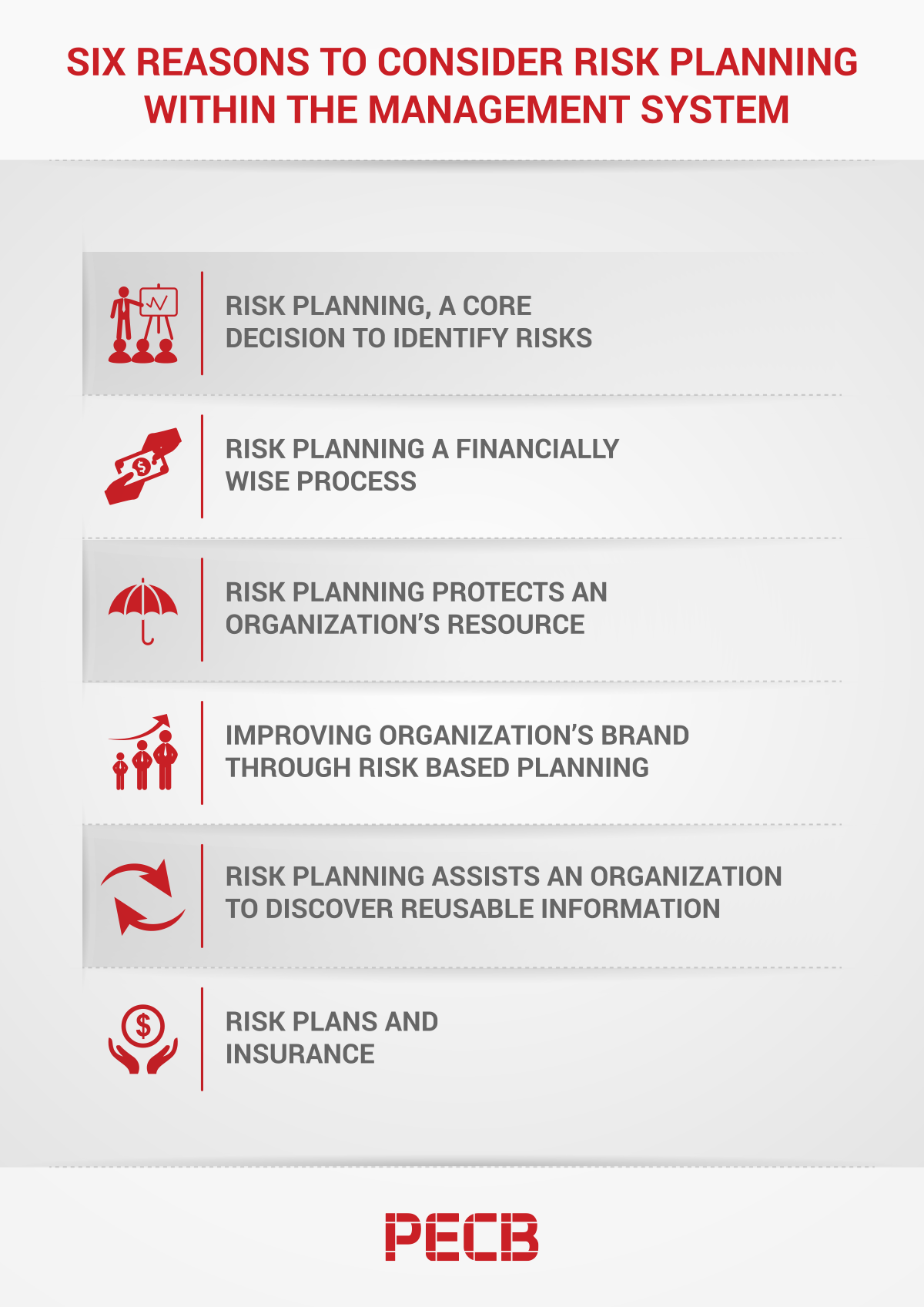The maximization of profit and efficiency are the main quality objectives for any organization. Developing actions to address risks and opportunities when planning will assist an organization to evaluate the level of risk in an operational context. Risk evaluation and analysis are important aspects of any quality management system. The new ISO 9001:2015 identifies within its introduction the importance of “risk-based thinking” and considers that an “external delivering of goods and service” should not target only core processes, but encompass the organization in a holistic approach. While the ISO 9001:2008 version of the standard has always implicitly been geared towards mitigating and avoiding risk while utilizing the PDCA model, the new 2015 version calls out explicitly “risk-based thinking” in addition to the PDCA model. ISO 9001:2015 often is a pairing risk with an opportunity to provide a wide overview of the prevention of risk and a promotion of opportunities to think of risk prior to a near interaction. This standard expects from an organization to address risk affecting products and/or services provided, in order to improve quality as well as customer satisfaction.
The importance and benefits of a risk-based methodology
The purpose of any quality management system is achieving conformity to satisfy applicable statutory and regulatory requirements. If risks are continually considered throughout the organization, the possibility of achieving aimed objectives is enhanced, the output is more consistent and customer expectations will be higher regarding products and/or services.
Why is it important for a company to adapt Risk-Based thinking?
- Improved governance
- Improved customer satisfaction and confidence
- Established proactive culture of prevention and continual improvement
- Boosted strong knowledge base
- Assured consistency of the quality of products and/or services
- Improved customer services
- Other benefits
- High confidence of stakeholders and proper use of risk techniques
- Helps organizations to apply management system controls to identify and analyze risks and minimize losses
- Higher management system performance
- Enables organizations to react and protect their business while increasingly growing, and gives stability
Six reasons to consider risk planning within the management system
Organizations that are affected by risk can have consequences in terms of professional reputation and financial metrics, including environmental, safety as well as social outcomes. Hence, effectively managing potential risk helps an organization to have a higher performance track record in an environment full of uncertainty.
The risk is always considered to be a part of every business, company, or organization. However, it is very important to know how to deal with negative risk. Incorporating risk evaluations will help companies to determine the levels of risks, in order to decrease and mitigate the potential negative risks and permit a better decision for the future potential risks.
RISK PLANNING, A CORE DECISION TO IDENTIFY RISKS
It is the duty for any organization to identify and curtail potential risks. If an organization is aware of potential risks that are related to their business, avoiding them will be easier in the long run. By being aware of the risk, top management will be able to make a plan to reduce the impacts, even if the risks are recognized, management will have a better decision-making process in place and deal with them.
RISK PLANNING, A FINANCIALLY WISE PROCESS
Organizations that have already planned for risk are more financially prepared when a problem may present itself. Businesses that have risk planning in place will be more likely to have loans and other financial instruments in place to remain operational in times of need.
RISK PLANNING PROTECTS AN ORGANIZATION’S RESOURCES
Risk planning assists the organization to respond to potential risks accordingly and appropriately. These kinds of actions will help an organization to focus more on the working tasks that are related to the day-to-day business operations. It also assists the organization in regards to time, money and overall resources required for a higher level operation or working performance.
IMPROVING ORGANIZATION’S BRAND THROUGH RISK-BASED PLANNING
If an organization has applicable risk planning in place, it demonstrates and shows the overall positive manner about how the organization operates. All of the members of an organization will have more confidence and higher moral when they are working for a respectable and responsible organization. The customer also will then be satisfied that they are doing business with a professional and proactive organization.
RISK PLANNING ASSISTS AN ORGANIZATION TO DISCOVER REUSABLE INFORMATION
To manage risk, an organization needs a collaborative effort and many people involved. Information that may be needed to be learned and communicated through processes of risk planning and mitigation can be applied in the similar situations, which may arise after the plan has been developed. As a result, people that are impacted by the plan do not need to start from the beginning, whenever the problem needs to be resolved, but may need continued training whenever significant changes to the organization do occur.
RISK PLANS AND INSURANCE
Including different types of insurance is one of the key assurances of risk planning. The best way to defray the negative impact of risk is by having proper insurance in place.
PECB is a certification body for persons, management systems, and products for a wide range of international standards. As a global provider of training, examination, audit, and certification services, PECB offers its expertise in multiple fields, including ISO 9001 Quality Management System courses

AUTHORS
Jason Teliszczak is the CEO/Founder of an international firm; JT Environmental Consulting. Mr. Teliszczak and his highly qualified and knowledgeable consultants assist clients in implementing best practices, gain, and/or maintain certifications within, but not limited to the: Aerospace, Data Security, Energy, Engineering, Environmental, Food Defense/Safety, Medical Devices, Quality, Safety, Security, and Waste industries. Please feel free to contact JT Environmental Consulting at info@jtenv.com









